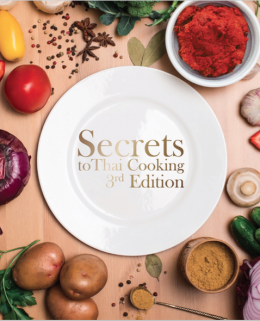Secrets to Thai Cooking
Thai cuisine has become globally popular as a result of its unique characteristics and its rich flavours, derived from a huge variety of ingredients. Each dish has its own flavour from different signature ingredients as well as the delicate and detailed process of preparation and cooking. The ingredients and the cooking process contribute to dishes that are a feast for the senses, with a vast array of flavours, be they sourness, saltiness or sweetness, not to mention the richness of coconut milk and the fiery heat of chillies. They all add to the colour and flavour of Thai food as well as the popularity of this cuisine among Thais and foreigners alike.
The variety of ingredients, in terms of both herbs and spices, in the dishes has also led to Thai cuisine being widely accepted in foreign circles as a healthy cuisine. Thus, the massaman curry, through its rich, spicy flavours that appeals to the tastes of foreigners, has become the most popular dish on the menus of Thai restaurants overseas. Apart from the famous massaman curry, there are other dishes that have been acclaimed overseas for a long time and have since become signature dishes of Thai cuisine. These include Tom Yum Gung (spicy sour prawn soup), Pad Thai (Thai-style stir-fried flat rice noodles), Som Tam (papaya salad), Gaeng Khiao Wan (green curry), Khao Pad (Thai-style fried rice) and Nam Tok Moo (Thai-style spicy pork salad). And the list keeps growing as more and more people explore Thai cuisine, for example, Pad See Ew (Thai-style stir-fried noodles with sweet soya sauce) is currently gaining widespread popularity.
In addition, Thai cuisine has four regional variations corresponding to the four geographical regions of Thailand. Each has its own unique characteristics, derived from local wisdom and tastes. Southern Thai cuisine has a strong, spicy flavour with turmeric as the signature ingredient in almost every dish – this spice also assists in the healing of stomach ulcers. The North, with its mountainous topography and its cooler climate, calls for dishes that are more fattening to warm the body.
The Northeast or Isaan region, has two main flavours: saltiness and spiciness. Sticky rice is also the main accompaniment to meals in this region. Finally, the Central region is the most gastronomically blessed, with access to ingredients from across the country, leading to a wide variety of dishes, such as snacks, chilli sauces, dips, various curries (both with and without coconut milk), Yums (spicy salads) and Thai desserts.
Smiling faces, the “wai” greeting, Thai food, Thai boxing, Thai massage and exotic Thai architecture are examples of the universally known hallmarks of Thai culture. Among all these, Thai food has perhaps established itself as a “global brand”. As an exporting country of agricultural and food products, the Thai Food to the World project is a key priority for the Thai Government in its overseas promotional campaigns.
In recent years, the Thai government has put a lot of energy and resources into promoting Thailand as a “Kitchen of the World”. It managed to increase the number of Thai restaurants overseas and raise the export volume of Thai food ingredients and other related products. To build up the momentum the nation has created, the Thailand Foundation, in collaboration with the Ministry of Foreign Affairs of Thailand, wishes to introduce to food lovers around the world Secrets to Thai Cooking, a simple, user-friendly cook book.
Secrets to Thai Cooking presents some of the dishes recommended by CNNGo in its list of the “World’s 50 Most Delicious Foods” by four renowned chefs in Thailand (three Thai and one Australian). All the dishes are delicious and easy to cook. Most of the ingredients can be easily found in Asian supermarkets.
Secrets To Thai Cooking is published in three languages: English, French and Spanish. Copies are available free of charge at Royal Thai Embassies and Consulates General around the world. We hope from now on you will be able to enjoy Thai flavours not only at your local Thai restaurant, but also in your own home.



